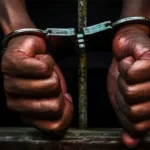Mutasa, Zimbabwe – A gripping case involving the alleged avenging spirit of Father Matara, a Roman Catholic priest murdered in 1971, has unfolded in Chief Mutasa’s community court, leaving the local community grappling with the supernatural and the lingering trauma of an unsolved crime. The case centres around the Banhu family, who claim to be haunted by the priest’s spirit, accusing one of their own, Cosmas Banhu, of involvement in the murder.
The matter was brought before the court by Tongai Banhu, who testified that his family has long endured accusations of being responsible for Father Matara’s death. He recounted the decades-long burden: “Growing up, my family was ostracised and labelled as killers in our community. Even finding love was a challenge, as girls were hesitant to date us. However, I eventually got married and started a family. But now, I am facing a new set of problems. Every night, I wake up to find my children sleeping outside, and our home is plagued by bizarre occurrences. We were told that it is the avenging spirit of Father Matara, who was murdered by my uncle.”
Father Matara, a priest from Bocha under Chief Marange, was serving at St Barbara’s Mission in Mutasa when he was murdered. His unsolved murder, Tongai explained, has cast a long shadow over the community. The family’s attempts to find answers led them to consult various prophets and traditional healers. These consultations revealed a startling claim: that Cosmas allegedly possessed a shape-shifting snake, capable of transforming into a chameleon, used to ward off Father Matara’s avenging spirit.
Despite this revelation, Cosmas, Tongai claimed, refused to participate in further consultations with traditional healers, maintaining his innocence. Complicating the matter further, the family visited the Matara homestead in Bocha, attempting to make amends. However, Chief Marange cautioned the family members to carefully review any agreement before signing, a warning seemingly ignored by Cosmas, who signed a document acknowledging his role in the priest’s murder.
Cosmas, however, vehemently denied all allegations, presenting his own account of the events surrounding Father Matara’s death to the court. He stated: “I was staying in Bulawayo and had returned to my rural home for the holidays. I wanted my child to be baptised at St Barbara’s Mission where Father Matara was stationed. Upon arrival, I was informed that Father Matara was in Rusape, so I returned home, but it was already late. The next morning, Father Matara was found dead. He was also robbed. Police officers came to my homestead inquiring about the time I left the mission, as suspicions arose that I was involved in Father Matara’s murder.” He added that he and his brother were questioned by the police but ultimately cleared of any wrongdoing.
Cosmas further argued that if he were responsible for the murder, the avenging spirit would haunt his own immediate family, not his brothers’. He insisted: “My hands are clean. If I were truly responsible for Father Matara’s murder, his spirit would haunt my immediate family, not my brothers’ families. I did not kill anyone. It is my brothers’ children who are making these false accusations.”
The court proceedings also heard testimony from Tongai, who detailed further consultations with Madzibaba Gutu, a local spiritual leader, who confirmed Cosmas’ alleged involvement in the murder. However, despite an initial admission at the Matara homestead, Cosmas later retracted his confession.
After considering both sides of the argument, Chief Mutasa adjourned the case, advising the Banhu family to seek further spiritual guidance from a neutral traditional healer to resolve the matter. Expressing concern about potential bias, Chief Mutasa cautioned against consulting Madzibaba Gutu, suggesting instead Sekuru Shungirai Mukotsanjera from Nyanga, a prominent sangoma who is has made a name for himself when it comes to solving issues pertaining to avenging spirits (ngozi).
Following this advice, the family consulted Sekuru Mukotsanjera. This consultation ultimately led to a breakthrough. The avenging spirit, manifesting through a woman, initially demanded 50 cattle as compensation, a figure later reduced to 30 through Sekuru Mukotsanjera’s intervention.












